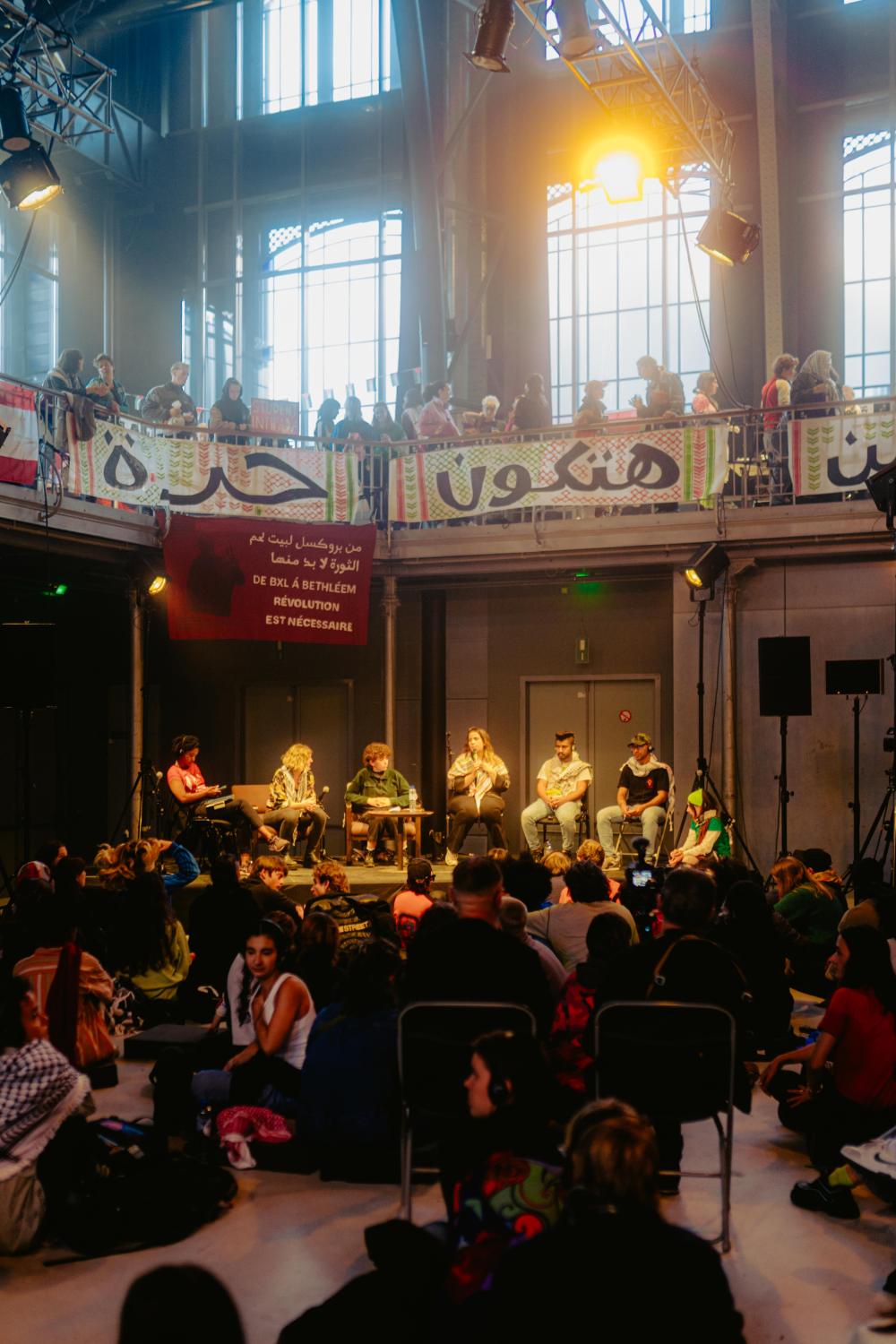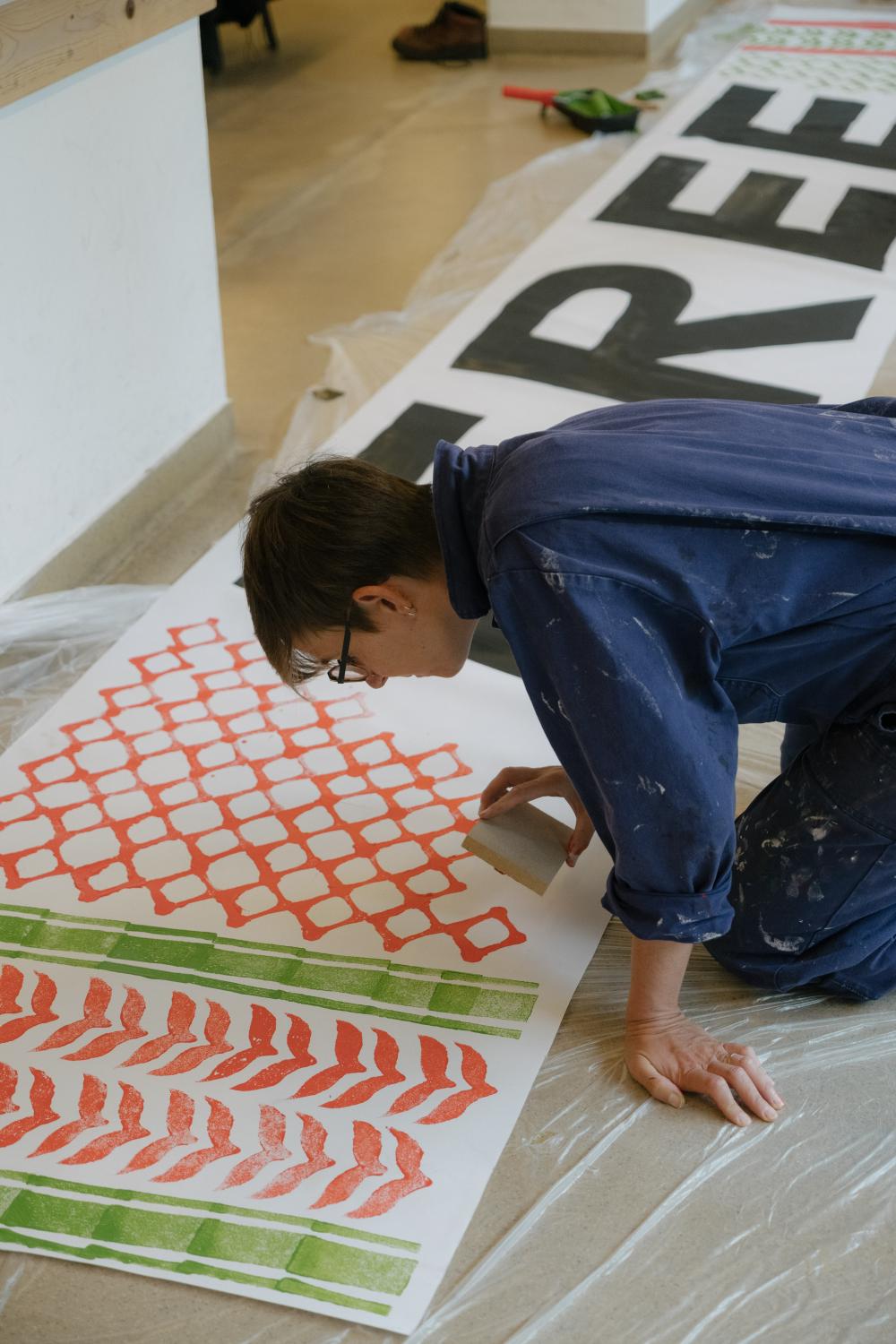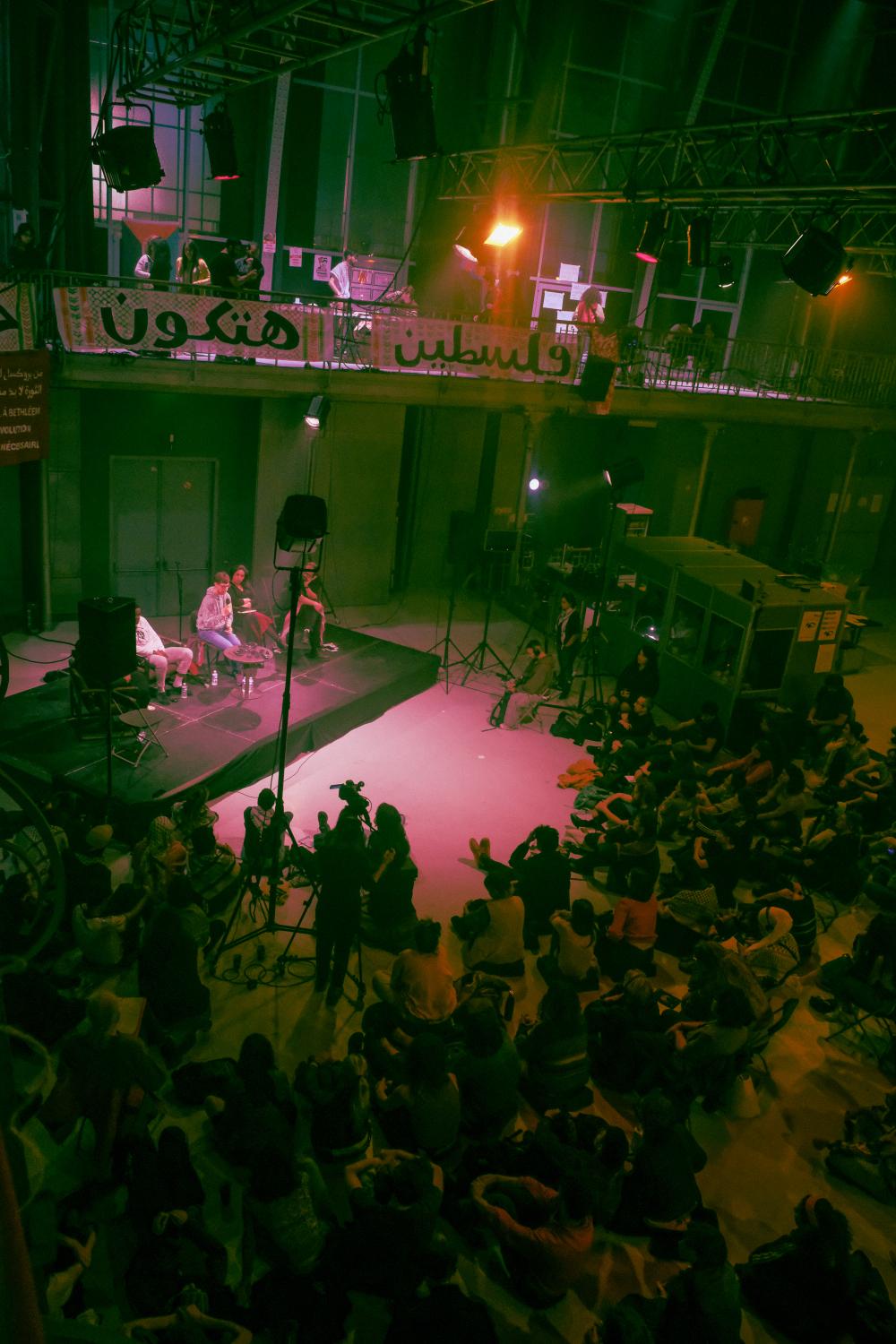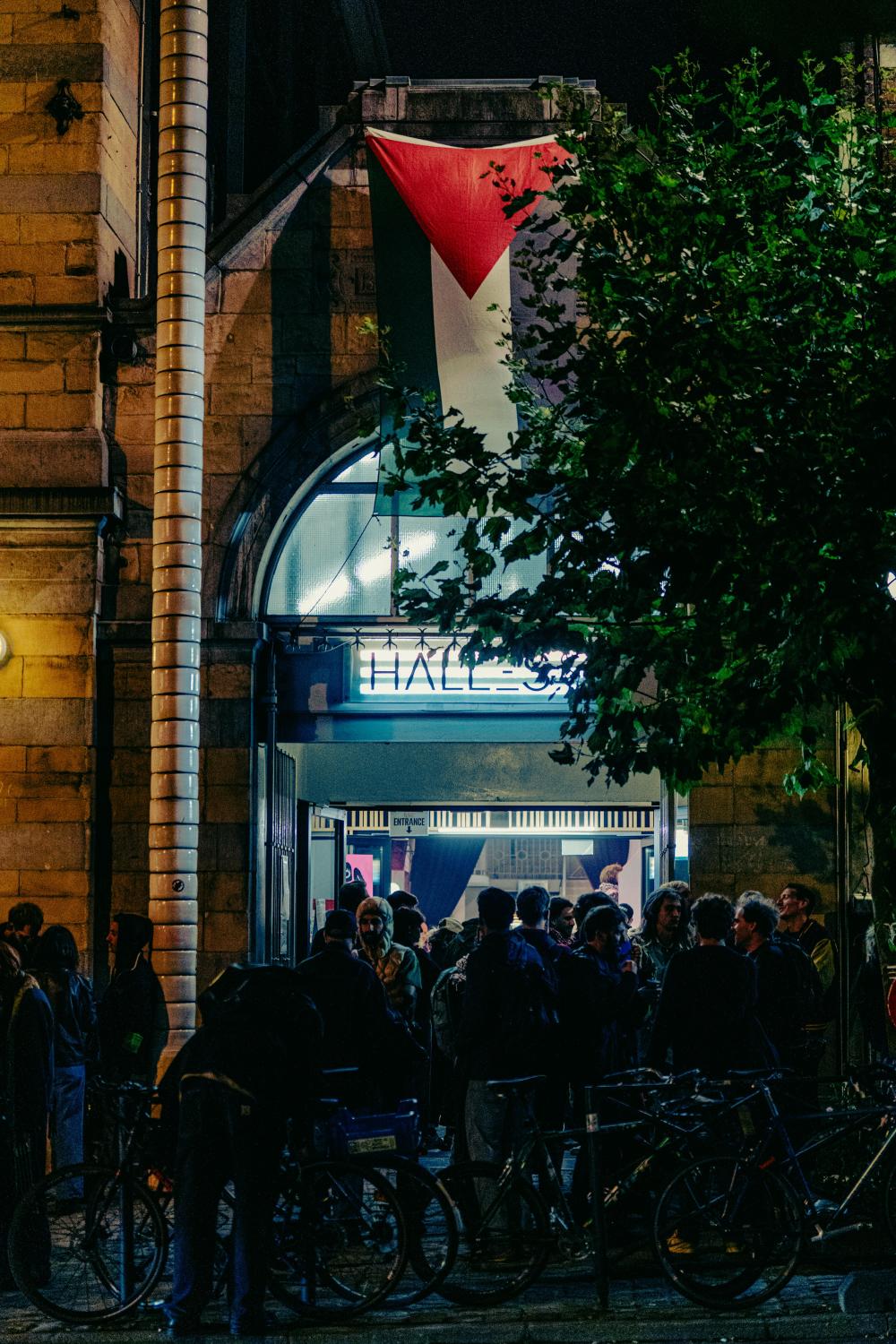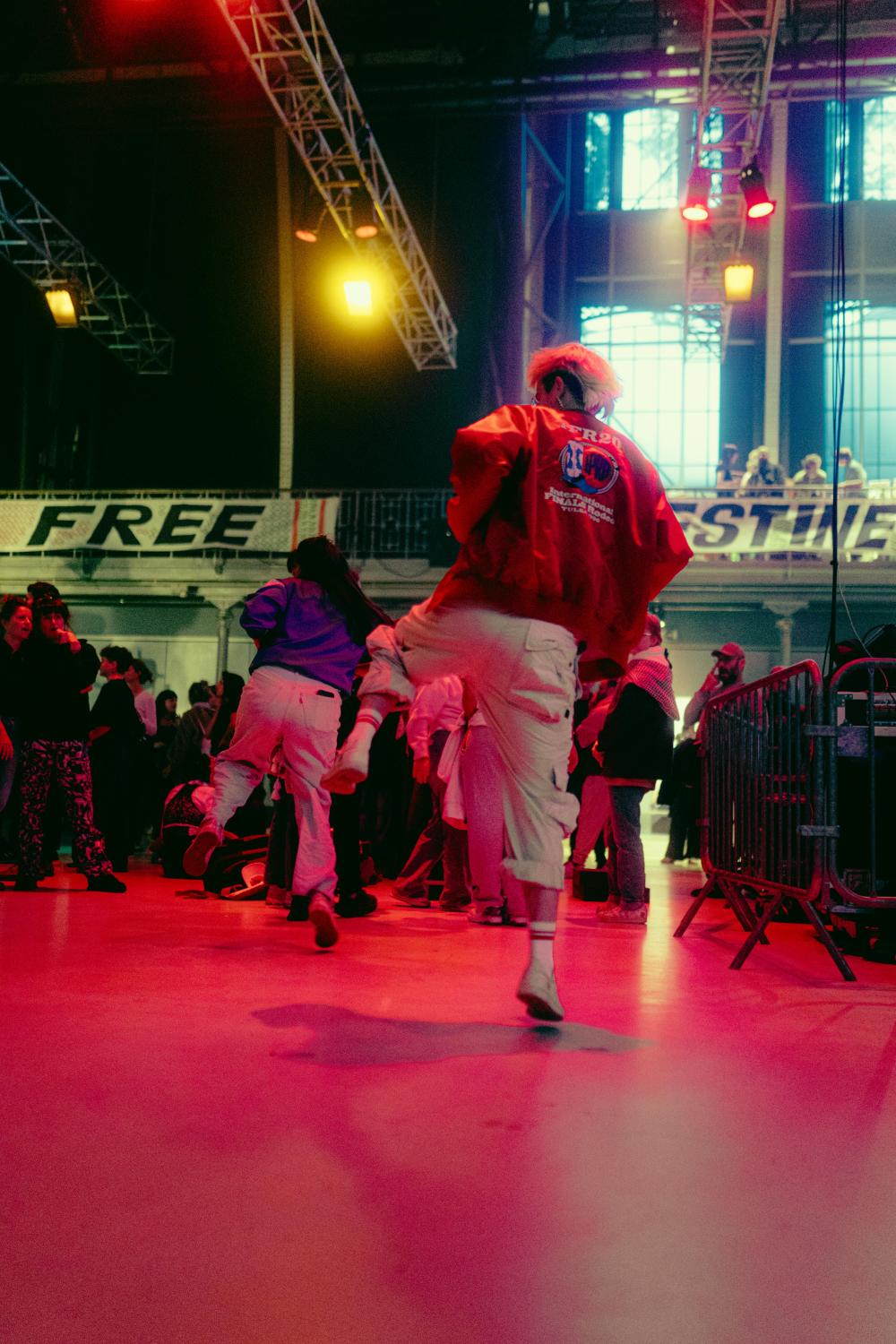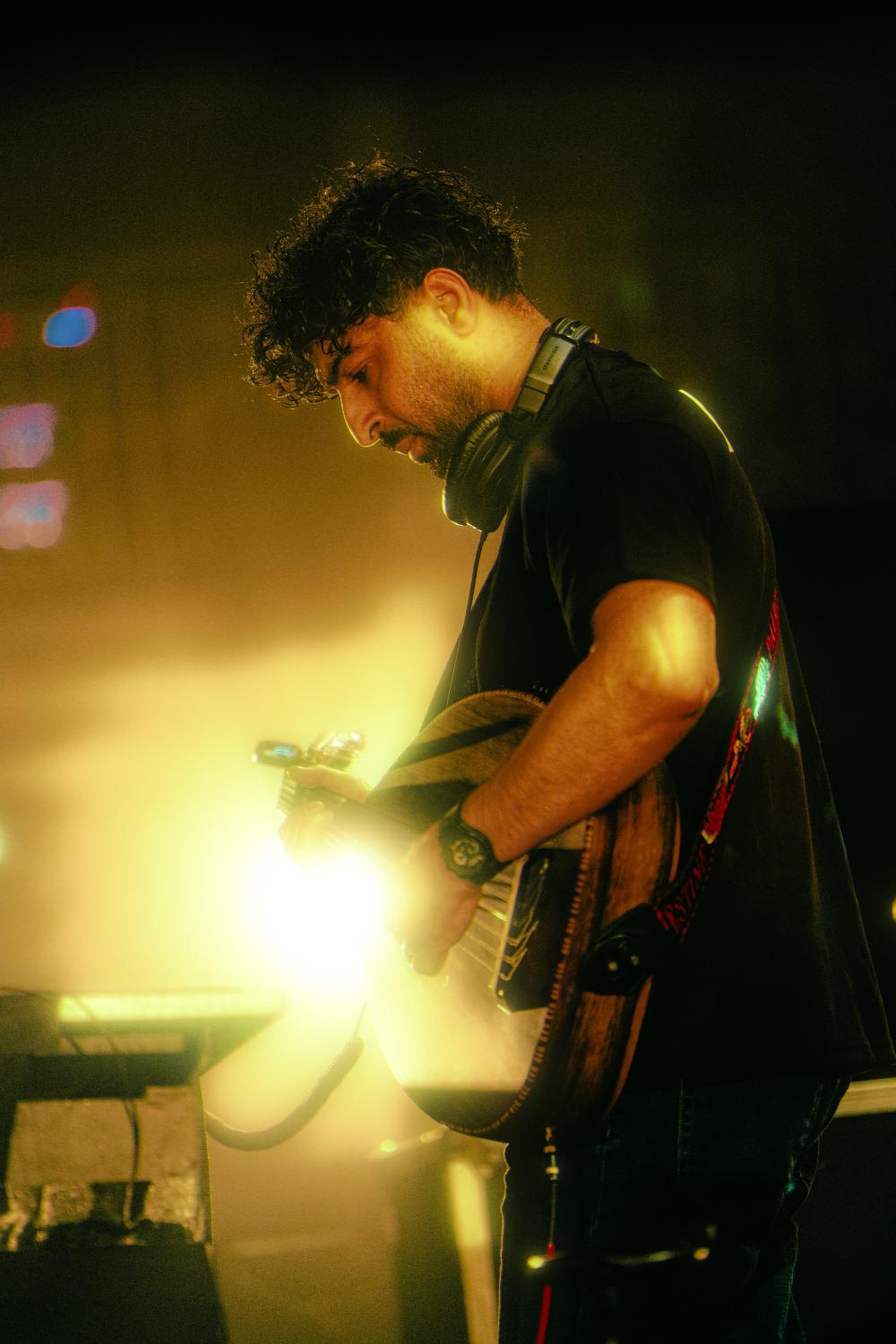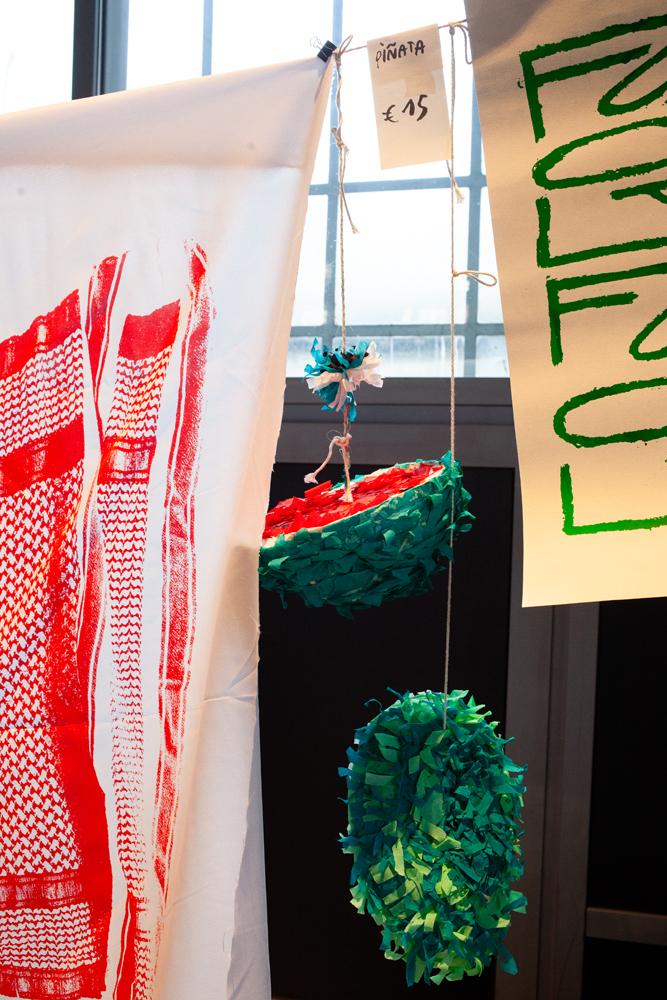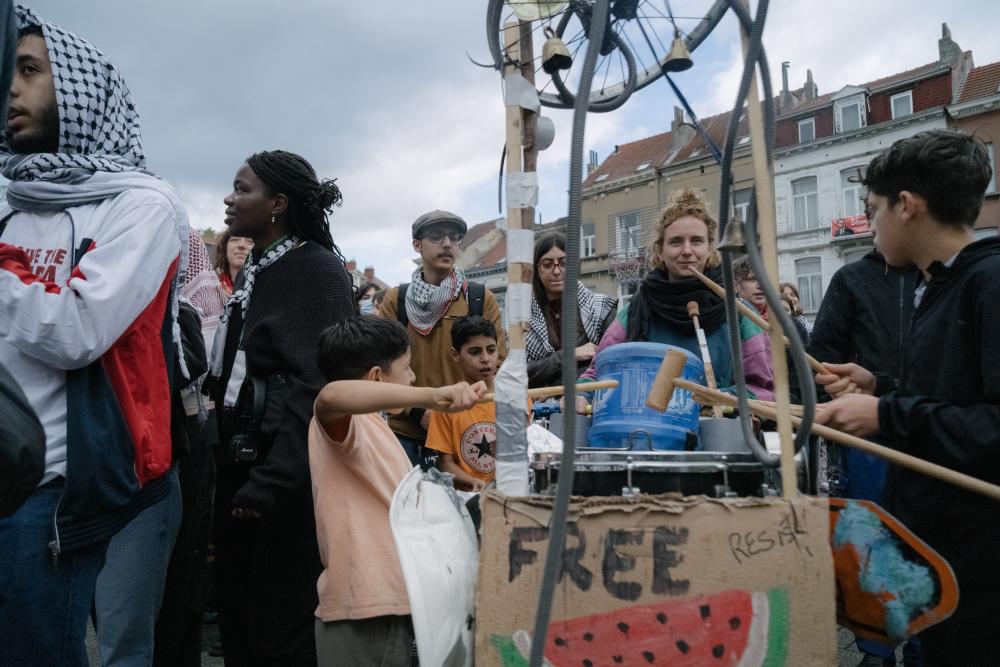my eyes are covered in dust
by Flora Woudstra Hablé
Flora Woudstra Hablé a écrit ce texte sur le blog there is no moon in the city ...and yet all is illuminated, à l'occasion de l'événement Estafette for Palestine le 28/09/2024 à Schaerbeek.
notes on solidarity, empathy, anger and community, taken during the September 28th "Estafette for Palestine" morning program at De Kriekelaar, Schaerbeek
There is a numbness in my soul as I’m winding through the streets of Schaerbeek.
Israel’s violence is nothing new, my mother said. It’s been happening since before we were born. “But when it happens to people you know,” she told me on the phone, “it’s suddenly coming very close.”
I can tangibly imagine the buildings shattering around me, rubble choking the Place Liedts, children screaming and mothers weeping. This morning, the death of Hassan Nasrallah, leader of Hezbollah, has been all but confirmed, and plumes of thick, brown smoke still rise from a smouldering crater in Dahieh. Many lives were lost, many more were broken forever. And yet here I sit on my bike, useless, feckless, profiting from my first world passport and feeling an anger that cannot be directed anywhere.
It is a cold day, but the sun is warm. The great chestnut trees at the community centre are taking on an ochre shade. Inside, a part of Brussels gathers for workshops and banner-making. There is dabke-dancing, there is free coffee and tea. Young people sit on the ground painting cloth in colours of black, red and green. I’m at the prelude to the Estafette for Palestine, a large-scale community event to benefit Palestinians set to happen later that day in the Halles de Schaerbeek. Here, there is no war, except in the back of the mind of everyone present. There are smiles and faces of utmost concentration. There is shared grief and shared joy.
“It’s been happening since before we were born. But when it happens to people you know, it’s suddenly coming very close.”
Here we all sit, sheltered in Europe, but not sheltered in our minds. Narratives on Israel, Palestine and Lebanon bounce around on our airwaves and in our communities, telling us to trust in Israel as a legitimate state, to cheer at the slaughter of the barbaric hordes seeking to disrupt the dominion of the Only Democracy In The Middle-East over stolen land. We resist those narratives one way or another, choosing our sense of justice over the moon and stars of delusion and indifference.
Despite our overwhelming helplessness in the face of a military industrial complex hellbent on the erasure of the Palestinians and the subjugation of the Lebanese, the people here have come together anyway to play their small part. They do not feel hopeless, so it seems, or they would not have come.
“We resist those narratives one way or another, choosing justice and morality over the moon and stars of delusion and indifference.”
Such are the kind of thoughts lingering in my mind as I sit down to speak with the individuals present at the community centre, hoping to gain some insight into their motivations, their emotional state, their hopes and fears, in order to clarify for myself and my community what it is that propels us forward despite the crushing weight of it all. How do we fend off our own cynicism? How can we dance dabke in spite of mass murder, how does one dance for a friend buried under heaps of cruel rubble?
Arabic folk music drifts through the halls of the centre as I talk to a friend sitting behind her laptop. She is designing flyers in the proud colours of the Palestinian flag. She is a well-known sight in these circles, a francophone Bruxelloise with a shock of bright red hair framing her face.
In front of us, a young couple embraces - she, wearing a keffiyeh, dark ringlets dangling over her back, he, as blond as he is tall, proclaiming how happy he is to have come.
The macro level is always the most visible, proclaims my friend. But this is the micro level. It is just as important. Change does not happen all at once, at a huge scale. Change brews in the streets and in the underground movements. And once in a while, it manages to be amplified, to come streaming forth and take up the space it needs. She proudly gestures to the community centre around us, tells of the plans for the Estafette in the Halles de Schaerbeek later. She has been helping out at the daily Palestinian protests at Gare de Centrale, she tells me. There is never enough material, never enough support. Here, there is.
“The macro level is always the most visible. But this is the micro level. It is just as important.”
It is a small victory, but a victory nevertheless. I see it in the faces of the people entering. This is how a counter-movement becomes a movement of its own.
I sit down in the sun next to another friend, a man I’ve met in the protest marches. His height is offset by his ever gentle disposition, which makes him an easy person to talk to. I feel a tinge of guilt for asking him to speak in English rather than his native French, but then again, we all speak in tongues beyond our own these days, whether through the forces of globalism or simply because we extend curiosity beyond our own borders.
Before we begin our conversation, I ask my friend to fasten the Lebanese flag around my shoulders. My own connection to Lebanon is frail at best, its foundations resting on a dusty history of chain migration and Frenchified surnames. Over the years, I’ve added a few pillars to this foundation: summers spent in Lebanon, friendships forged on street corners and at house parties. It is these pillars that oblige me to show the the red, white and green of the cedar flag on my back.
I bought this Lebanese flag during the protests of 2019. Here it is on September 24th, 2024, in front of my window in Brussels.
I ask my friend about his reasons for coming today, knowing that he is a stalwart ally of the daily Gazan protests at Gare Centrale and a common face at any march for Palestine. He answers that for him, community is the answer to our modern hyper-individuality, which has distorted us into a new sort of human beings, without bonds and without solidarity. These days, “community” can be a thin concept, referring, for example, to a network of artists who only ever recognise each others needs in a work context.
My friend believes we can rebuild community as a concept rooted in solidarity. It is not our shared backgrounds or interests that should bind us, but our convictions and willingness to help. That is what he is seeing today. The institutions propping up todays events are a welcome tool to broaden the scale of the protest, he says, to infuse new life at a time where street protests are dwindling in the face of a protracted war with no end in sight. “We need to be consistent,” he insists; “to continue showing up, no matter what; to build lasting relationships with each other.”
“Community is the answer to our modern hyper-individuality, which has distorted us into a new sort of human beings, without bonds and without solidarity.”
Truly, I contest, our solidarity will not and cannot save Palestine or Lebanon, but we are capable of disrupting the mechanisms of capitalist society that lead to its destruction in the first place. The logic of hyper-individualism, of solipsistic pursuit of wealth and ownership, is what is at the root of issues such as land grabs, expansionism, and indeed the eradication of undesirable populations. It may seem to the reader quite a leap to extrapolate genocide from a lack of solidarity, but I invite you to think it all the way through and realise that, when transposing the micro to the macro level, people from all walks of life coming together and supporting one another is indeed antithetical to concepts such as borders, defence, safety and scarcity.
A man offers me a hit from his joint; I gladly accept, being physically and mentally drained and eager for a bit of diffusion. I ask him about his place in the collective and his reflections on his reasons for coming.
He is a musician, Flemish and “middle-aged”, as he describes himself, though I would estimate him to be a bit younger than that. He speaks with great conviction, stating that he cannot let injustice pass. When I ask him about his emotional state, he answers that it’s a mixture, but that anger, fear and love are all on the same level. “The opposite of love isn’t hate, it’s indifference,” he says. “I want things to change, and it all starts from the ground up.”
He relates that his great-grandparents were resistance fighters during the last great war that Belgium experienced. This family history has imbued him with a sense of justice stronger than the need for conformity. Said conformity can be dangerous, he warns: “As a group becomes more uniform, it also becomes more dangerous. The mentality shifts and empathy for others vanishes. That’s the end of solidarity, too.” Protests such as today, he contends, are a way of building community and family, based on shared values.
“As a group becomes more uniform, it also becomes more dangerous. The mentality shifts and empathy for others vanishes.”
I can’t help but agree with his assessment that uniformity breeds intolerance. From what I’ve seen in my three years of living in Belgium, the attempts of the Flemish right-wing to define “Flemishness” have been as asinine as they have been insipid, but they have effectively undermined the Belgian project as a whole, dividing the country into haves and have-nots along fault lines of language intermingled with class.
Conformity is the first step in an insidious pyramid of enmity, which can distort us into jingoistic narcissists incapable of feeling the pain of another as our own, and ultimately allows us to turn away from the horror in Gaza, to babble emptily about “the complicated Middle-East” as babies lose their heads and blocks of apartments are flattened with flimsy justifications. To have solidarity with Palestine and Lebanon is not to become Palestinian or Lebanese, but to regain your core humanity and recognise another as human, I truly believe.
“Conformity is the first step in an insidious pyramid of enmity.”
Reeling from the conversation, I sit down next to a young Algerian-Belgian woman. She is positively vibrating with enthusiasm, itching to take the energy she is seeing today home to Wallonia. She speaks of her frustration with efforts to build a consistent protest movement in Namur, a city with less than a tenth of Brussels’ population nestled close to the Ardennes. “I had to come here and experience being in a space of care,” she says. “Everyone here has the same objectives, which means a lot in a world that feels very hostile.”
As we speak, she develops a new plan for revitalising the pro-Palestinian movement in Namur, determining that perhaps all they need is a weekly moment to gather in a regular place.
We bond over our shared experiences, coming from households where the Palestinian cause was always a topic of discussion. In this new information age, she says, “everyone has become an expert.” She has watched people who were previously unaware and uninterested become fierce supporters of the cause. The first-hand information on social media has bred “empathy, not compassion,” she insists. “It is on equal ground, not from up above.”
“It’s empathy, not compassion. It is on equal ground, not from up above.”
As I commend her for this turn of phrase, she backtracks to say that compassion, while not as equitable, can also be a force for good nevertheless. Even when it is condescending, compassion can bring material change: donations, aid organisations and petitions can all be born from compassion, too.
“Sometimes I wish I wasn’t so empathetic,” she admits. “Empathy also brings you down, where you could be taking action instead.”
I know exactly what she means. It can be paralysing to be overwhelmed with emotions, to feel your heart shatter with every piece of bad news. In Lebanese Arabic, “ya albi” (my heart) is a term of endearment - but if you allow other people to become part of your heart, it will also break into a thousand pieces whenever they are hurt.
Unfortunately, we cannot change who we are, and so we cannot change the fact that we feel very deeply. Our tears are not a weakness, however. I cried during the event, too, because that is how I process these things. So be it - to feel deeply can also be a very beautiful thing.
The woman from Namur agreed. What she notices the most in this moment, she tells me, is the absence of care and denial of solidarity. In her hometown, a girl approached her during a protest, bluntly stating that she was not concerned with Palestine. When asked for a reason, the girl answered that “they are not [her] people.”
Callous indifference is born from a culture of hegemonic conformity. Indeed, the answer is to resist through creating solidarity on a micro-level. It is exceedingly easy to imagine that random girl from Namur on a tank rolling over the Lebanese border, launching rockets at civilian targets while reasoning that it is none of her concern and that these are not her people.
““Ya albi” (my heart) is a term of endearment - but if you allow other people to become part of your heart, it will also break when they are hurt.”
After thanking the woman from Namur for her insights, I sit down next to a middle-aged Moroccan-Belgian man. We converse in a mixture of English and French. In contrast with many others at the gathering, this man never smiles.
The perfect English word to describe his state of being, he tells me, is revolted. He is revolted by the news from the Levant. “When I was younger, I told myself: you don’t have these lignes, these links, to Palestine. But the more I read, the more videos I watched, the more revolted I became.” He describes his slow descent into full awareness of the Palestinian situation and what it did to him emotionally. He describes a video of a little girl, 5 years at most, who survived a bombing. “She was covered in poussière,” he tells me, struggling to find an English translation. I begin to notice that his eyes are tearing up. “Rubble,” I formulate. “Dust.” He tells me that he has a niece the same age as that little girl. “The look in her eyes was so empty,” he explains. “It changed my mentality. I can’t accept this. It’s too much.”
I relate some stories of my own, just to take the pressure of him. I tell him of a friend who assured me that I shouldn’t worry about his life, because the resistance would be more important than his survival. I explain that I told this friend that I wanted him to live anyway, perhaps selfishly, perhaps because in the context in which I live, I have never been forced to articulate a concept of martyrdom.
We are two strangers sharing a vulnerable moment. This is solidarity put into practice: we are striking a match of commonality.
“The look in her eyes was so empty. It changed my mentality.”
I excuse myself to go to the bathroom. Truthfully, I am embarrassed to cry in public and I need a moment. The lack of sleep is making me more emotional than normal. I pass happily playing children on my way to the toilet, and I can’t help but imagine them covered in poussière as well.
When I return to the community centre, I cross paths with an Egyptian man in his thirties. He lights up the room when he walks in, his eyes full of life, a big smile etched on his face. When I talk to him, he explains that he was unsure if he should come, because “as Arabs, we can also be confronted with trauma when we go to a protest. But today, I pushed myself.”
He explains how heartening it is to see a gathering like this - as an Egyptian, it is abundantly clear to him that freedom of speech and freedom of assembly are both privileges that cannot be taken for granted.
His activism is relatively low-key, he explains. The Egyptian state can and will check his social media to determine if they will deny him entry back into his homeland. His ability to visit family and friends is always on the line.
And yet he is glad to have come today, because the gathering can take his mind off his constant worries. “It’s always a fight to be present,” he says earnestly. “During a time like this, our mind is with so many people. I’m very grateful for places like this - my heart is full and worried.”
It is a beautiful quotation which I eagerly write down. We talk about our friends in Lebanon, about our messages back and forth, about how it sometimes feels like you’re living in two places at once.
We cannot continuously be absorbed by our phones, saturating our minds with images of carnage. In the end, says the man, it’s also a mental war. We should keep sending our friends those same, awkward messages asking if they’re okay. This is showing solidarity, he says, and it is more important than “confronting yourself with the fucked up situation.”
“We should keep sending our friends those same, awkward messages asking if they’re okay. This is showing solidarity, and it is more important than confronting yourself with the fucked up situation.”
It is a very down-to-earth way of thinking about activism and the Palestinian cause. In a way, it ensures that we don’t center ourselves and our experience. Of course it matters that we are affected by video evidence of brutalities and suffering, but it matters more what we subsequently do with it.
Never let the empathy turn into apathy, in other words.
The next person I talk to is a Palestinian from the West Bank. He is an older man with a mischievous smile and an easy charm about him. He wears his experiences on his sleeve. He frankly tells me that he has PTSD from everything he’s been through.
I relate a quote from an earlier conversation to him: about empathy, not compassion. He rejects the idea. “We are strong. We don’t need people’s empathy. We needed help sixty, seventy years ago. We have heard this bullshit for seventy years, everybody lies. Talk is cheap. They say one thing and do something else.”
He stops himself and apologises for getting angry. I tell him that there is nothing to be sorry for. Anger is one of many emotions we use to process things, and if there is one person here who can reasonably be angry, it’s him. I ask him what he does with his anger: he answers that he runs a bath at home and screams into the water. “Or I go to the demonstration,” he says. “I scream: ‘Free Palestine.’ It helps with the demons I have inside.”
“We are strong. We don’t need people’s empathy. We needed help.”
He shows me his shirt. It is a football jersey which displays the Palestinian colours - but the Arabic text clearly says “Algeria.” He realises the mistake on the shirt as we speak. “It’s no good,” he says, and begins searching in his bag. He pulls out a few protest stickers and puts them over the word that says “Algeria.” With an amicable softness that reminds me of my family, he puts a few stickers in my hands as well, and tells me I can have them.
People are starting to gather outside. It is nearly time to begin the march from the community centre to the Halles de Schaerbeek, where the Estafette will take place. I rush inside - my time is almost up, and I want to speak to more people, hear more reflections.
I end up conversing with an older woman. The colours of her hijab are muted, but a fire burns brightly in her eyes as she speaks. Our only shared language is French, and I try my best to ask her intelligent questions, though they inevitably remain quite basic. She feels very strongly propelled by a sense of justice, she tells me. She can’t sleep at night. She’s feeling a mixture of anger and sadness. The way she speaks is eerily reminiscent of my mother. The same tightness around the mouth, the same trembling indignation, mixed with a heavy despondency as she speaks about the death of children.
She tells me that she’s happy to see such a diverse mix of people at the centre. I tell her who she reminds me of. We both thank each other for being here today.
Outside, the crowd masses, and the Student Intifada comes down the steps of the community centre cheering and beating drums. There is no despondency here, only the splendour of a group of young people proud of what they have achieved. Their chants are gradually repeated by the crowd. The beautifully steno-graphed banners are unfurled, volunteers are called to help carry them. A young woman begins a speech: the wind suddenly picks up at the end of her address, as the sky turns starkly grey. The weather is not with us, but the people are.
“There is no despondency here, only the splendour of a group of young people proud of what they have achieved.”
On our way to the Halles de Schaerbeek, police flank us like nervous dogs, running circles around our ankles, as if to remind us that we are the counter-movement still. Rain comes down as we pass by balconies where Palestinian flags have been hung from the railings. I meet a classmate in the crowd; she has a Lebanese flag draped over her shoulders, too.
“I didn’t know you were Lebanese,” she tells me, and I’m tempted to say that once upon a time, I did not know either, but that I was forced to confront that part of myself or forever shut my eyes to injustice in the world.
As we walk, messages continue pouring in on my phone, a sleepless friend who tells of a night of non-stop bombings, a news article verifying Nasrallah’s death for good, a friend who confirms that another friend, whom I knew to reside in Dahieh, was safely with her at the time of the bombing. The sun pricks through the clouds just before we reach the Halles de Schaerbeek. The Estafette commences as I must leave the crowd to go to my job. Waving the newly forming community goodbye, I ride my bike with my thoughts drifting back to Beirut.
My heart is full and worried.
